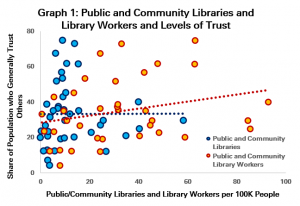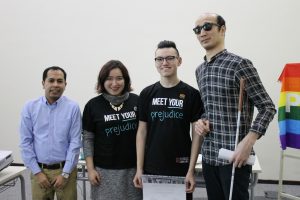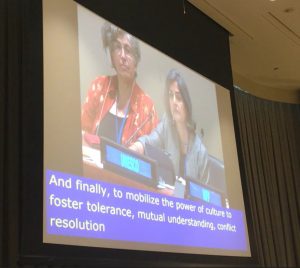Our world is faced with a range of challenges linked to intolerance, and its consequences. These have dominated the headlines in 2020: large-scale demonstrations demanding racial justice, inequalities facing the LGBTQ+ community around the world, terrorist activity, the rise of nationalist groups, and the ongoing xenophobia that threatens the livelihood of the world’s most vulnerable communities. Existing tensions have been compounded in 2020 as the world grapples with the COVID-19 pandemic.
There is a great deal of progress that must be made in order to create a world where every person’s human rights are upheld – despite differences between us.
What can libraries do to help counteract these challenges that feed a climate of intolerance?
For UN International Day of Tolerance (16 November) let’s take a look at the role of libraries in countering intolerance, and discuss how library professionals can advocate for their role in building tolerance within individuals and communities.
Countering Intolerance: The UN’s Perspective
The UN outlines the following key areas for countering intolerance:
- Laws: Governments are responsible for enforcing human rights laws, for banning and punishing hate crimes and discrimination and for ensuring equal access to dispute settlement.
- Education: Laws are necessary but not sufficient for countering intolerance, greater emphasis needs to be placed on educating more and better.
- Access to information: The most efficient way to limit the influence of hatemongers is to promote press freedom and press pluralism, in order to allow the public to differentiate between facts and opinions.
- Individual awareness: Intolerance breeds intolerance. In order to fight intolerance individuals should become aware of the link between their behaviour and the vicious cycle of mistrust and violence in society.
- Local solutions: When confronted with an escalation of intolerance around us, we must not wait for governments and institutions to act alone. We are all part of the solution.
Libraries are champions of access to information and life-long learning, as well as being community gathering places.
Therefore, if education and access to information can counter the fear of the “other” that drives intolerance, then we – the global library community – have a vital role to play.
Read on for some advocacy tips on how libraries can make a difference in several of these key areas.
Education
Over the past five years, there has been a troubling rise in xenophobic sentiment. Gallup’s 2020 update of its Migrant Acceptance Index found that the world has become less tolerant of migrants since the Index was launched in 2015.
As worrying as this trend is, it is important to remember that no one is born harbouring feelings of intolerance. This behaviour is learned, and therefore, it can be unlearned, or at least countered, through education.
In 2020, the IEA (International Association for the Evaluation of Educational Achievement) reiterated results from their International Civic and Citizenship Education Study (ICCS) carried out in 2016. These results show a positive correlation between the civic knowledge of young people and their level of tolerance towards immigrants in Europe [Source, page 1].
As young people with higher levels of civic knowledge tend to be more tolerant, the IEA urges policymakers and educators to strengthen efforts to provide learning opportunities that focus on building this understanding. Key competencies include the importance of ensuring equal rights for different groups in a democracy, as well the ability to identify potential threats to democracy [Source, page 8].
Although focussed on migrant acceptance, it follows that these lessons are also relevant in terms of marginalised groups within an existing population.
Advocacy point:
Libraries provide learning opportunities outside of the formal education system. They can build on the skills students learn in the classroom, enhancing them with a variety of materials, resources, and opportunities to engage with others in the learning process.
Libraries also provide lifelong learning opportunities – which can be a vital way to deliver civic knowledge to adults who may not have had access to these lessons in their schooling.
If education on civic participation and democratic society is essential for social cohesion, then library educators can help these learning opportunities reach people at all ages.
Access to Information
We live in an information society. On average, people have access to more information than at any other point of human civilization. However, the past years have seen a growing trend of “fake news”, conspiracy theories, distrust in the media, and a rise in disinformation campaigns that erode the foundations of democracy. Many of these campaigns gain power by capitalising on people’s fear of the “other”, deepening mistrust and intolerance.
In 2020, we have seen the impact that misinformation can have towards people’s health and livelihoods, and the dangerously powerful effect it has on public opinion. UNESCO has dubbed this the “disinfodemic”.
Beyond personal health choices, misinformation around the Coronavirus also has an impact on rising intolerance. For example, it has caused an increase of anti-Chinese sentiment [source] and hate-speech directed at Asian people [source]. This reflects trends of past health emergencies, such as the association of homophobic sentiment with the emergence of HIV/AIDS in the 1980s [source].
Accessing health information, as well as information about other cultures, beliefs, and world events is vital to a society that is equipped to handle the challenges of today. However, this access to information also comes with a responsibility to learn to navigate the current climate of misinformation that seeks to deepen societal divides.
UNESCO’s Media and Information Literacy Programme seeks to fight the trend of misinformation by helping communities engage with media in a ways that promotes equality, intercultural and interreligious dialogue, peace, and freedom of expression.
See the Five Laws of Media and Information Literacy for more background on UNESCO’s position.
Advocacy Point:
The importance of critical thinking in regard to the media we consume is more important than ever. A tolerant information society cannot be achieved without it.
Note Law #5 from UNESCO: “Media and information literacy is not acquired at once. It is a lived and dynamic experience and process.”
Libraries play a vital role not only in access to information, but in building media and information literacy skills. Libraries enable media and information literacy to be a lived experience for learners at all levels, providing tools, resources, and assistance in accessing information, thinking critically about sources, and using it ethically.
For more resources, start with the IFLA Media and Information Literacy Recommendations.
For countering Fake News, see IFLA’s How to Spot Fake News – COVID-19 Edition
Local Solutions
The UN stresses that every individual has a role to play in building tolerant societies.
Although complex, global issues can seem insurmountable, change begins at the local level. Libraries are welcoming public spaces – free of charge – that in some parts of the world, have seen a marked social turn, “changing focus from collections to connections” [source].
In this unique role in society, libraries can be on the front lines in promoting not just tolerance, but an appreciation for multiculturalism. The IFLA/UNESCO Multicultural Library Manifesto reiterates the role that libraries can have in promoting cultural and linguistic diversity at the international, national, and local levels.
IFLA has also stressed that racism has no place in the society libraries are working to build. Libraries reject discrimination and actively promote inclusion, working at all levels to provide everyone a meaningful opportunity to realise their rights to information, culture, information and science.
Advocacy Point:
IFLA has found that countries with more public and community librarians tend to have higher levels of social cohesion. By crossing statistics from IFLA’s Library Map of the World with those from the OECD’s Society at a Glance 2016 publication, we can begin to visualize the role that libraries have in building social cohesion through general societal trust in one another.

For more, see Library Stat of the Week #26: Countries with more public and community librarians tend to have higher levels of social cohesion
What can you do?
For librarians working at the local level, here are some ideas of steps you can take to help combat intolerance within your community.
- Share resources on tolerance and anti-racism
- Help raise awareness within your community on world events, discuss reasons for migration and immigration from a global perspective.
- Ensure your collection features a wide variety of stories, and storytellers of different backgrounds
- Offer programmes targeted at reducing inequalities in your community. See IFLA’s SDG Stories on Goal 10: Reduced Inequalities for inspiration.
- Engage with local NGOs, citizen movements, and educational institutions to celebrate the diversity of communities and promote positive, inclusive discussion.
- Enhance your library’s offering of media and information literacy resources. See this guide for low/no-cost ideas.
Do you have other ideas on how libraries can help their communities fight intolerance and build social cohesion? We’d love to hear from you! Share your thoughts below.

